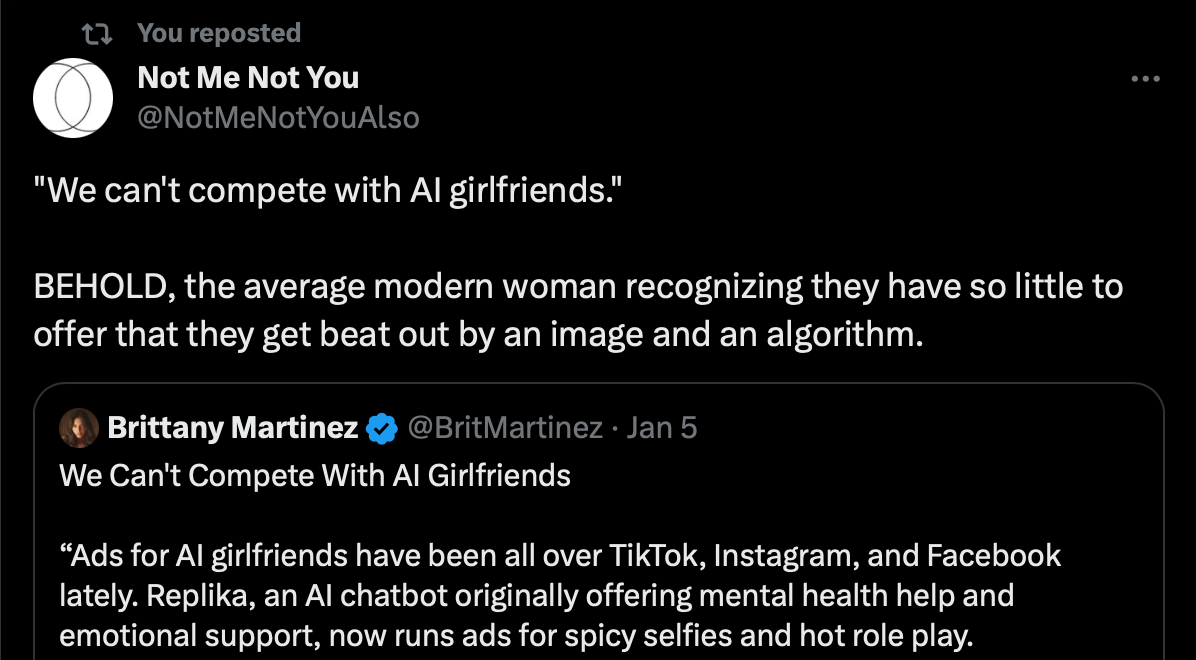While I generally avoid arguing with women on the internet, this article is particularly terrible and worth commenting on purely as repudiation to the “longhouse.”
First things first; DO NOT USE A.I. GIRLFRIENDS. Do NOT download the app, do not play with them just for fun; don’t touch this stuff.
With that out of the way, Brittany Martinez advertises the article with “We Can't Compete With AI Girlfriends.” I found the article through a tweet responding to her, which basically summarizes the absurdity: if you can’t compete with “A.I. girlfriends,” that sounds like a you problem, not an A.I. or man problem.
Her article is subtitled “Design a girl who is “always on your side,” says Replika.” Which necessarily beings attention to the idea of a girl being “on your side.” Let’s respond in a question-and-answer format to the idea that “[women] can’t compete with AI girlfriends.”
Ask a wife: do you want your husband to “always be on your side?” Obviously, any woman will answer yes, and likewise, no man or woman will always be “on your side,” down to the most minute argument. But, as a general principle, men and women reasonably expect their counterparts to be “on their side.” Again, if you can’t reliably be considered to be “on your husband’s side” or “on your wife’s side,” that sounds like a you problem.
The article then asks:
“[I]f AI girlfriends really do become as pervasive as online porn, what this will mean for girls and young women who feel they need to compete with this?
Most obvious to me is the ramping up of already unrealistic beauty standards.”
Since it’s 2024, the year of the tenth anniversary of Gamergate, this hearkens back to what we heard in 2014 about “unrealistic beauty standards.” It’s a tired refrain that originates before 2014. I happened upon a tweet about this game Nikke that keeps getting advertised on Twitter.
https://twitter.com/ShiftUpWorld/status/1741368744423600593
This is what she looks like in-game.
Now, obviously, this is a supermodel, and what we are talking about is “standards,” not peak performance. But it’s worth pointing out, just as a matter of record, that something like the digital depiction of the A.I. girlfriend featured in the article is not “unrealistic” in terms of simulating what a woman could actually look like.
While this A.I. model is quite “dolled up,” it certainly isn’t particularly remarkable in terms of what a real attractive woman could potentially look like. In terms of “ramping up of already unrealistic beauty standards,” well, you could have fooled me, because I see no evidence of such “standards” in the real world, where most women are much fatter than they used to be. Is it unrealistic for them not to be fat? Obviously, no, because if you look at the actual “standards” in, say, the 1980s, understanding the “standards” being represented not in some document but simply in terms of the status quo of what people actually looked like, everyone was more fit and attractive in general. These A.I. girlfriends, like the video game girl, are certain not a standard, but even if they did serve to improve standards (which they don’t), maybe that would be a good thing?
“But it’s also unhealthy for a generation of girls already hating how they look, suffering from facial and body dysmorphia, and seeking cosmetic surgery in record numbers.”
Again, these “standards” are actually enforced by women and the standards are not coming from digital women but from a general negrification of women. The cosmetic surgery she refers to is no longer boob-jobs but ass inflation and lip injections to make white women appear more like black women, which is a top-down cultural phenomenon being enforced by the anti-white state. Things like the A.I. girlfriends have basically nothing to do with these surgeries, nor do what men want. Beauty standards are almost always female driven, so to all women out there, I simply ask: “please stop trying to be black.”
Now we get to the worst part of the article, which is good because talking about “muh beauty standards” is quite tiresome. Here, we meet the real meat of the sex problem.
“But it isn’t just unrealistic beauty standards that worry me. What’s even more sinister is the unrealistic emotional standards set by these apps. Eva AI, for example, not only lets you choose the perfect face and body but customize the perfect personality, offering options like “hot, funny, bold,” “shy, modest, considerate,” and “smart, strict, rational.” Create a girlfriend who is judgement-free! Who lets you hang out with your buddies without drama! Who laughs at all your jokes! “Control it all the way you want to,” promises Eva AI. Design a girl who is “always on your side,” says Replika.”
Wow. A girlfriend who doesn’t create drama between you and your friends and laughs at your jokes. Imagine that. Yeah, customizing a woman like this is not real, but there is nothing about what she complained about here that is odd except for “judgement-free.” Like, imagine wanting a hot, considerate, and smart girlfriend fellas!
We can address this as before, with a question-and-answer format. Let’s take the six traits that best map to both sexes, and ask any woman if she wants her boyfriend or husband to be:
Hot
Funny
Bold
Considerate
Smart
Rational
It turns out there is an app that allows women to customize their perfect boyfriend like this, and it’s called Tinder. I joke, but only partially.
The article then asks:
“How can we compete with that?”
Well, ironically, for all the complaining about “beauty standards” this is actually how women can most easily “compete” with these A.I. girlfriends, and it is also what modern women are most lacking at. To even us the word “compete” in this context borders on absurdity, because an A.I. girlfriend cannot possibly hope to match the “emotional support” that a real woman can provide. Unfortunately, modern women are mostly in a permanent “competition” mode with men rather than a supportive or charming mode. Indeed, the biggest problem with modern women is not actually that they are fat, but that they lack charm.
I was reading the biography of Robert E. Lee a few weeks ago, and something that kept coming up was how much he enjoyed conversation with women. It’s difficult to imagine how this could possibly be so enjoyable, but one must remember that women were once “charming,” and could hold fun, teasing conversations with men at length. It’s a lost art for both sexes, but some good old-fashioned charm and the most basic of physical affection would effortlessly overcome anything an A.I. could possibly hope to offer.
The fact that a woman feels she cannot compete with the emotional support provided by an A.I. tells us very little about the A.I. (or men) and reveals to us everything about the problems with modern women.
The reason that this article is worth writing and reading at all is not to have some sort of inter-sex dialogue with so-called “right-wing women” who run magazines like Evie, but to point out that these online women are nothing more than another variation of power feminists who put on airs of “traditional femininity” while at the same time still seeking to enforce rather than degrade the longhouse regime. The “A.I. girlfriend” is simply another competitor for power. They are presenting “traditionalist-friendly” ways of ensuring that women retain power. A natural product of a universal suffrage democracy, but one that serves no interest of the genuine right.
In fact, the idea of “right-wing women” is a nonsense concept. Women as an abstract organizational unit are always entropic, always an enemy castle. The only woman that is and should be on your side is your wife. To avoid misunderstanding, it should be understood that when we (right-wing men) talk about “women” as an abstract concept, this excludes the wife. The wife as a person, despite being a woman, is discrete from “women” as a group. She exists as a special category of one, having been selected out of all other possible women. To the extent any wife supports women’s power groups, she is undermining her husband. The only exception is a group of wives, which can actually be a positive form of in organized womanhood, but this is extremely rare these days.
To reiterate the point: women are afraid that they cannot match the emotional support offered by a robot. This says very little about men and robots and everything about the degraded state of modern women. Women cannot provide emotional support because they are competing with men for power. You cannot support a competitor; it’s an oxymoron. People talk about how men have porn addiction; Women have power addiction. As a matter of revealed preference, it is clear that women are more interested in power than in their traditional feminine roles.







